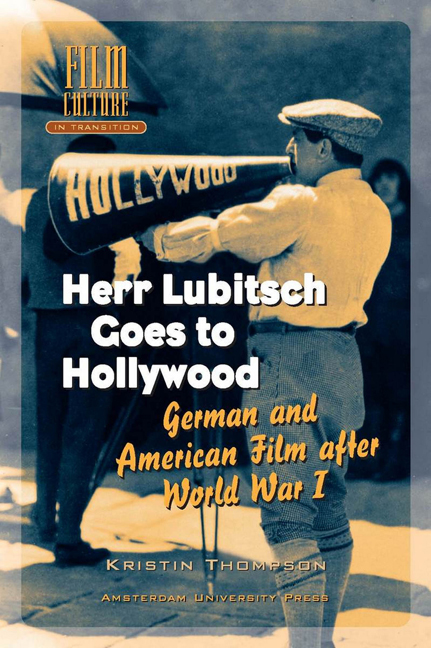Book contents
- Frontmatter
- Dedication
- Contents
- Acknowledgements
- Introduction
- Chapter One Lubitsch’s Career
- Chapter Two Making the Light Come from the Story: Lighting
- Chapter Three Subduing the Cluttered Background: Set Design
- Chapter Four Guiding the Viewer’s Attention: Editing
- Chapter Five Peeking at the Players: Acting
- Chapter Six Mutual Influences
- Epilogue: The Lubitsch Touch
- Notes
- Filmography
- Index
- Film Culture in Transition
- Plate Section
Chapter Six - Mutual Influences
Published online by Cambridge University Press: 14 January 2021
- Frontmatter
- Dedication
- Contents
- Acknowledgements
- Introduction
- Chapter One Lubitsch’s Career
- Chapter Two Making the Light Come from the Story: Lighting
- Chapter Three Subduing the Cluttered Background: Set Design
- Chapter Four Guiding the Viewer’s Attention: Editing
- Chapter Five Peeking at the Players: Acting
- Chapter Six Mutual Influences
- Epilogue: The Lubitsch Touch
- Notes
- Filmography
- Index
- Film Culture in Transition
- Plate Section
Summary
Equipping for Influence: The Modernization of German Studios
In the mid-1920s, Robert Florey offered some advice to French film producers wanting to compete with the Americans. His suggestions, pertinent to other national film industries as well, usefully summarize the beliefs widely held within the German film industry of 1921 and after:
It would seem necessary, for a start, to install some good, large studios equipped with all the modern improvements, and above all lights, indispensable lights. In these same studios there would need to be built sets which do not have the feel of sets, props which do not make the public laugh, in short everything which contributes to producing a normal film – so normal that one would forget its nationality. Because of this, it becomes international. It can show on all the screens of the world, so that all audiences can understand it as they understand simple, normal American films, but properly, clearly, adequately staged, with light, a great deal of light, and performed by actors trained for the cinema and who have not had to reach the screen after remaining on the stage for 35 years.
Florey assumes “normal” films to be classical films, as made in Hollywood. They would have realistic-looking sets, lights directed into the scene from multiple points, cinematic acting, and above all comprehensibility (“simple, normal American films”).
I have argued that Lubitsch was simply the first and best of the German directors of popular cinema to integrate Hollywood influences into his films.We have seen that Lang and Murnau adapted aspects of continuity editing in their Expressionist films, but Lubitsch was earliest, I believe, to adopt the combination of techniques that constituted classical filmmaking. On a technical level, particularly in regard to lighting, he was able to do so because he had access to the American-style facilities of the EFA studio. The technical journals of the day suggest that other filmmakers would have liked to have made films in the new Hollywood style, but they were hampered by a lack of facilities. Nevertheless, as more dark studios were built and equipped with a variety of lamps, three-point lighting replaced the diffused sunlight and glaring, frontal arclight of the postwar years. Continuity “rules” of editing were less easy to assimilate, since the principle of maintaining constant screen direction would not be obvious when viewing a film; like Lubitsch, directors would learn cutting techniques more gradually.
- Type
- Chapter
- Information
- Herr Lubitsch Goes to HollywoodGerman and American Film after World War I, pp. 109 - 126Publisher: Amsterdam University PressPrint publication year: 2005



